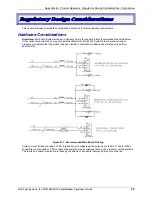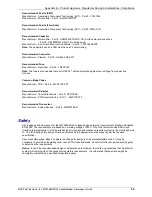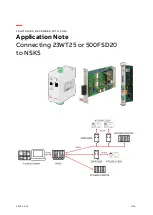
Appendix B – Product Approvals, Regulatory Design Considerations, Compliance
Multi-Tech Systems, Inc. MT2456SMI-22 SocketModem Developer’s Guide
55
(ii) For a new model that is registered to a family of previously certified TE, the self-marking format shall be:
IC: XXXXXX-ZZZZZZZZ
Where:
·
“XXXXXX” is the Company Number, as in (d) above ; and
·
“ZZZZZZZZ” is either the old certification number minus the old company number, or a new Unique
Product Number assigned by the applicant. For example, if a new model is registered to the family of
products with certification number “123 1234 A”, and that the Company Number for the registration is
“123A”, then the self-mark for this new model would read “IC: 123A-1234 A”. If the applicant decides to
replace “1234 A” with a new UPN, say “5678", then the self-mark would read “IC: 123A-5678".
Industry Canada
This Class B digital apparatus meets all requirements of the Canadian Interference-Causing Equipment
Regulations.
Cet appareil numérique de la classe B respecte toutes les exigences du Reglement Canadien sur le matériel
brouilleur.
Multiple Listing
This terminal device may be multiple listed to other distributors based upon the approval granted to the original
certificate holder. In order to obtain a multiple listing certification, the following documentation must be presented
to Industry Canada:
(a) The model number, Industry Canada certificate number and certification number of the approved equipment;
(b) A letter from the original certificate holder authorizing the Department to use information on file to grant a
multiple listing certification. The name/model number, certificate number and certification number for the
subject equipment must be shown. The letter must also declare that the model to be multiple listed is
identical in design and construction to the originally approved model;
(c) A letter, from the proposed multiple listee, requesting the certification;
(d) A Terminal Equipment Certification / Testing Application and Agreement form, completed by the proposed
multiple listee;
(e) A drawing, sample or illustration of the product label; and
(f) Payment in accordance with TRC-49 section on Multiple Listings.
New Zealand Telecom Warning Notice
1.
The grant of a Telepermit for any item of terminal equipment indicates only that Telecom has accepted that
the item complies with minimum conditions for connection to its network. It indicates no endorsement of the
product by Telecom, nor does it provide any sort of warranty. Above all, it provides no assurance that any
item will work correctly in all respects with another item of Telepermitted equipment of a different make or
model, nor does it imply that any product is compatible with all of Telecom’s network services.
This equipment is not capable under all operating conditions of correct operating conditions of correct
operation at the higher speed which it is designated. 33.6 kbps and 56 kbps connections are likely to be
restricted to lower bit rates when connected to some PSTN implementations. Telecom will accept no
responsibility should difficulties arise in such circumstances.
2.
Immediately disconnect this equipment should it become physically damaged, and arrange for its disposal or
repair.
3.
This modem shall not be used in any manner which could constitute a nuisance to other Telecom
customers.
4.
This device is equipped with pulse dialing, while the Telecom standard is DTMF tone dialing. There is no
guarantee that Telecom lines will always continue to support pulse dialing.
Use of pulse dialing, when this equipment is connected to the same line as other equipment, may give rise
to 'bell tinkle' or noise and may also cause a false answer condition. Should such problems occur, the user
should NOT contact the Telecom Faults Service.
The preferred method of dialing is to use DTMF tones, as this is faster than pulse (decadic) dialing and is
readily available on almost all New Zealand telephone exchanges.
5.
Warning Notice: No '111' or other calls can be made from this device during a mains power failure.
6.
This equipment may not provide for the effective hand-over of a call to another device connected to the
same line.




































